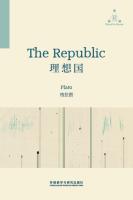Book Review
skyzarathus
As the representative work of Plato, the ancient Greek
philosopher, 《The Republic》 is a classic work of philosophy. However,
through the changes of time, it is inevitable that some of the
contents of this book are out of time when we look at it from the
perspective of modern people. However,from the perspective of Plato's
time, some content of this book is quite advanced.
In this book, what interests me most is not Plato's idea of the
Utopia, but the method used by Plato in the debate in this book.
Compared with directly refuting each other, Plato uses a more subtle
method. He uses a kind of induction to let each other gradually
improve and extend their theories, making them more specific. However,
in this process, the loopholes and contradictions of the other party's
theory will be exposed, which allows Plato to take the chance, seize
the loopholes of the other party's theory, so that the other party's
theory will break itself. This is a very delicate method. In fact,
this step-by-step guidance method runs through the whole book.
What interests me most is the “Cave metaphor” in this book. Plato
believes that a man who is determined to become a philosopher must
seek for the greatest knowledge—— the good, which is higher and more
important than justice and wisdom. The good is similar to the Taoist
"Tao", the origin of all knowledge and the greatest truth.
Justice and wisdom originate from the good. Here we can find out
Plato's objective idealism. Then Plato explained the way of philosophy
king with "cave metaphor ". This is his metaphor: there is a
group of prisoners in a cave. They are all tied up, and their bodies
cannot turn around. They are back to the cave entrance. There was a
white wall in front of them, and a fire was burning behind them. On
that white wall, they saw the shadows of themselves and the things
between them and the fire. Because they could not see anything else,
the prisoners would think that the shadows were the real things.
However, a man broke away from the shackles and get away from the
cave. He saw the vast world outside and saw the burning sun above his
head. He went back to the cave and tried to explain to others that the
shadows were just illusory things and told them the way of the outside
world. But for the prisoners, the man seemed more crazy than he had
been before he escaped, and declared to him that there was nothing in
the world but the shadows on the wall. This is the tragedy of
philosophers at that time. The influence of Socrates' death on Plato
can be seen everywhere in this book. The satire on prisoners and the
demeaning of tyrant politics can reflect this. However, Plato still
points out that when a person leaves the cave and has the
qualification to become a philosopher, he should not linger on the
life outside the cave, but should go back to the cave and lead the
prisoners to the truth. This is a great spirit of dedication, and it
is also the ultimate task of the king of philosophy.
Generally, after reading this book, my biggest achievement is
that I have a more comprehensive understanding of Plato's philosophy.
I have also understood some theory I didn't understand before. This
book makes the distance between me and this great philosopher seem to
be a little closer. It is no doubt a very rare and a very worthwhile experience.



 京公网安备 11010802032529号
京公网安备 11010802032529号